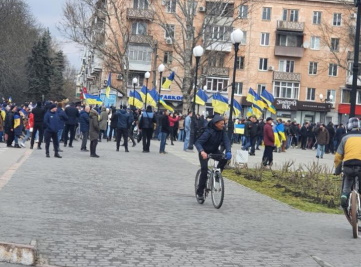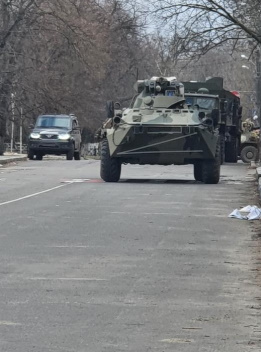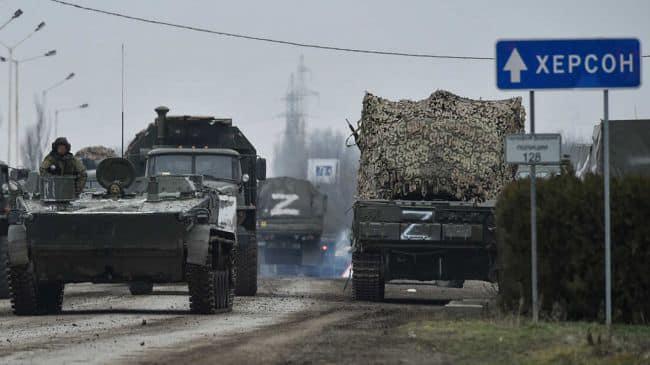“What is happening in Kherson is important as it has become a testing area for what could happen in other cities of Ukraine if occupied or if any other country in Europe was attacked by the Russian Federation,” said Johan Chytraeus.
“It is in Kherson that the Russian forces are testing all their ideas on a population that doesn't want to be colonized. What we see is looting, abuse, torture and rape. Kherson serves as a horror example for the rest of the world. When studying the conditions that the occupying forces have created, one understands why other parts of Ukraine are fighting forcefully for their freedom,” he added.
Russian forces attempted to isolate the Kherson Oblast from the world by cutting off the Ukrainian telecom system. It is increasingly challenging for residents to stay in touch with family members and friends and share information on military actions as Russian telecom networks filter the internet. Reportedly more than half of the population have fled the occupied area, and others are facing increasing problems with rocketing food prices and lack of basic humanitarian necessities. Anxiety and exhaustion are spreading, as are the statements on torture and abductions in the region.
Most of the people in Kherson occupied by Russian troops are on the verge of despair, but there’s hope for liberation
People who live in the city feel drained and depressed. Here is what they told Mr. Chytraeus when he asked to describe their mental state:
“I think that the general mood is a mix of fear, fatigue, and despair. This is because the occupiers are using force and coercion. They also use manipulation and propaganda. It is like they are enforcing some sort of silent terror by blocking the city,” a 41-year-old woman explained her feelings.
“Most people who stayed in Kherson have lost their jobs and any opportunity to earn some money. At the same time, prices of all goods have increased a lot, which makes necessities and medicines inaccessible to the people. Therefore, it feels like people are on the verge of despair now in Kherson,” a 28-year-old man said.

One interlocutor explained in detail a shift in mood from the early days of the Russian occupation:
“I think 99% of the people are suffering mentally from what is going on. In the beginning, there were several demonstrations held against the occupiers and this was at a time when many had not yet left the region. People were waiting for the liberation of Kherson, but they did not really understand how long time it would actually take, and they tried with all their might to stop the Russian bastards from doing their dirty work. Since then, I think one could say that the hatred has gone deep but you can also add a deep fear for your life and a sense of hopelessness eating you away from the inside. It has become too dangerous to openly oppose the occupiers,” a 27-year-old man told.
Another man described his unfulfilled expectations of the quick ending of the war.
“I asked some friends about their mood these days, and, well, it is mostly fatigue and grief. At the beginning of all this, in February and March, I recall common feelings like fear and confusion but also some victorious feelings because we were a bit blind then, compared to now. We thought this war would end in a few months, but as you know, we are still here, under occupation, and we see these assholes patrolling our city every day. They seem to feel themselves at home, and we are tired of seeing it.”
Abuse, human trafficking, and killing of civilians in Kherson occupied by Russian troops
Russian invaders systematically break international rules of war which state that civilians should not be a target of military actions. Nevertheless, media sources constantly report on sexual abuse committed by Russian soldiers. The risk of human trafficking from Kherson occupied in March to Crimea and eventually in Russia increased with an open border with the occupied peninsula.
Without operating Ukrainian police officers in Kherson, there is no safe possibility for alleged victims to fill in an application on a crime or inform local authorities.
People confirmed that they had heard about the crimes several times, including rape and killing when civilians had tried to leave Kherson. With restricted access to official information, it is impossible to measure and analyze any increase in abuse.
“I was informed that yesterday evening, Orcs raped a girl in XX region, in village XX2. She's alive but got serious traumas. The last time I heard about them raping girls was in March, but I don’t know anyone of these girls or have any proof, so I can’t say much about it,” a 22-year-old man commented on violence against women, calling Russians orcs, referring to destructive soldiers from the book of JRR Tolkien “Lord of the rings.”
Torture and detainment of civilians: “Russian soldiers asked my friend to dig his own grave”
Just as in Russian-controlled areas of Donbas, there have been numerous reports on detentions of oppositional residents in Kherson as Russia is tightening its grip on the region. Journalists, politicians, and NGO staff workers are targets. Several of the interlocutors have shared detailed information about friends and close people who have been victimized by the Russian army.
"Disappearances and arrests continue, but we as ordinary citizens know very little about how many have been taken away and how this whole situation has been developing. I heard that 150 people were detained, and as for the region, the numbers reach 500 people," a resident told.
Another person from Kherson said she knew two of her friends had been tortured and could confirm it.
Russian forces had begun a purge of people with a clear pro-Ukrainian position. An activist who had attended a rally, the next morning, left his apartment and got into his car. Suddenly a black minibus drove out from around the corner. Three people ran out of the wan, ran up to his car, and tried to open the door. He locked it, and they tried to break the car windows then. He quickly backed up and drove away, a local woman says.
One more case of violence against civilians happened in Kherson Oblast.
“My friend told me what happened when driving from one of the villages to the city. They had run out of food in their village because the Russians had robbed all the stores. When they drove to Kherson, trying to find some food, they were stopped at a checkpoint and forced out of the car. The Russians started to beat them. They gave my friend a shovel and asked him ‘to dig his own grave, while aiming at him with a gun, saying that they were going to kill him. After my friend had dug his grave, they took both of them to a basement where they beat them with their guns and splashed water on them,” told a 25-year old man who provided a photo of his alleged beaten friend.
The torture continued until the next day when they were finally taken out with bags over their heads and driven to town.
Living without rule of law

Russian armed forces are behind a wave of theft and looting in the whole Kherson Oblast. Locals inform that the robberies started directly upon the force’s arrival at the oblast and the first targets were ordinary shops, as the Russian soldiers didn’t have sufficient food rations.
“Now, when they have everything, they have started house robberies. And it is completely lawless. They can break any gate or door and tell you, "this is our house now, so you have some time to collect things, but leave all household appliances and electronics in the house and go." The same applies to private businesses. "They can loot any office they wish,” said resident of Kherson occupied by Russian troops.
The scale of the hostilities of Russian troops is hard to comprehend. Public demonstrations started to fade off in late March/early April 2022 as invaders began to shoot at a crowd and used tear grenades to disperse public gatherings. The residents of occupied Kherson assume that their exceptional aggression against demonstrations was caused by restrictions on freedom of expression in Russia. Now, they want silence in Ukrainian cities as well.
Numerous violations against the civilian population include not only illegal detentions and torture but also traffic incidents, sometimes with lethal outcomes. Ukrainians are filming the actions of Russian soldiers that fuel further public anger against the occupying forces and sharing news on social media.
There is no quiet village to hide from Russian troops
Locals say the situation is more complex and dangerous in the villages than in Kherson as Russian soldiers can go door-to-door looking for police officers:
“The Russians can actually take away anyone they find suspicious,” a 32-year old woman said.
The smaller communities and villages are allegedly more subjected to corruption and harassment of the civilian population.
“In Kakhovka and Nova Kakhovka the security situation is probably as bad as in Kherson but there, you need to pay the Orchs money if you want to do any business. You wanna go fishing – you have to pay them. You wanna sell your fish – you have to pay them. You have a café, bar, or a shop – you have to pay them and then continue with your job," tells a 22-year old man.
Ukraine and the Kherson Oblast have a history of successful partisan war, with stories from WW2 often cherished within some families, and there has been a public understanding that if a new war materializes, the partisan movement will resume in the country. It may explain several statements and observations on Russian forces allegedly searching for service persons from the police - occupying forces do not want to have new partisan warfare in the region. However, the resistance is growing.
Growing partisan movement of Kherson Oblast now bombs collaborators
Russia attempts to teach children how bad Ukraine is
Following the outbreak of war on 24 February and the siege of Kherson, the educational system has been completely interrupted. It has not been safe to bring children and students to the educational premises, and many teachers and pupils have escaped the region. It remains unclear when and under what conditions educational institutions can re-open in the region. There are rumors that the Russians want to cancel the summer holidays in schools to let Ukrainian children catch up with the Russian school program and Russian grammar.
"The occupiers tried to force teachers to go to Crimea for re-attestation so they would tell children that Ukraine is bad, and Russia is good - to tell the students the Russian version of world history. As you probably understand, there is not much appetite among Kherson teachers to go to Crimea and be part of this propaganda machinery. I have no idea how the occupiers are going to educate the young generation in our region, but hopefully, we will be liberated soon," a 41-year old woman said.
People are buying medicines on the streets, not in pharmacies
The outbreak of war caused panic and many drugstores saw their medicine supply go down as people were trying to buy as much as they could. Another person added that several drug stores were also robbed by Russian armed forces.
“In Kherson, you can now buy drugs that are mostly imported from the Crimea. There is a lack of several medicines. The available drugs are of very low quality and are not stored according to normal standards. For example, some people now sell medicines at the street market. It is +35 degrees outside,” tells a 38-year old man who witnessed Russian rule in the city.
Also, now it is impossible to call for an ambulance as the telecommunication system has been shut down.
Nearly four months into the war, the logistical lines to Kyiv-controlled areas have not resumed. The local population is forced to consume what can still be found or cultivated within the region or to buy products coming from Crimea or Russia.
What is the current food situation?
Kherson Oblast is one of the major agriculture producers in Ukraine, so vegetables and fruits can be found in local markets. But people can not sell them outside the region, that is why prices are in general low.
Following the Russian siege, logistical lines to Kyiv-controlled areas were cut off. More and more products are being imported from Crimea. At the same time, residents of Kherson do not feel enthusiastic about getting those products - eggs, milk, animal goods, juices, alcohol, cigarettes, sausage, meat, and household chemicals from occupied territory. People try to look for Ukrainian products instead, but it is getting more and more difficult. In some shops, stolen Ukrainian goods are being re-sold again.
Ukrainians are forced to use the ruble
There is since long a lack of Ukrainian currency (hryvnia) in cash and local banks remain closed. The occupying authorities are trying to implement the Russian ruble as currency but there is not much appetite for this in the region. People continue to use Ukrainian hryvnia, out of habit and convenience but also, as a way to show disapproval against the occupation.
Earlier, it has been reported that shop owners are obliged to at least indicate prices in both ruble and hryvnia. "If this happens again - your store will burn down unexpectedly,” Russian troops threatened a business owner who refused to accept payment in rubles. Russia’s closing of Ukrainian telecom networks makes personal online banking, which is a popular service in Ukraine, very challenging in occupied Kherson. To do bank payments, people require internet access, but all Ukrainian GSM providers are blocked.
“Banks didn't go anywhere, we weren't blocked. The problem is different. As there is no telephone connection, many people cannot open their mobile banking, because for this you need to receive a message from the bank on your cell phone. And there is no connection any longer. If you don't have a message with your personal code - you don't have banking. I always use Ukrainian hryvnia when shopping. I refuse to take a Russian ruble bill in my hand,” a 41-year old Kherson woman said.
The hard road out of the region: endless queues, sleeping in fields, and forced confiscation of belongings
People who try to escape from Kherson Oblast encounter several checkpoints and intimidating body controls. On some days during June, Russian soldiers did not let anyone pass.
The leaving civilians must often sleep in fields by the road or in nearby villages for several nights before being let through the Russian checkpoints.
Male travelers are often undressed, checked for tattoos, and thoroughly interrogated. "They arbitrarily confiscate cash, jewelry, and any other valuable items they find. They also do body searches, looking for specific tattoos. There are also complaints of intimidating touching of women during these body searches," a 41-year-old resident comments on how people are leaving Kherson.

Johan Chytraeus is former deputy team leader of the OSCE office in Kherson. On 5 March, the OSCE HQ had managed to evacuate from occupied Kherson; currently, he is in Sweden. The OSCE SMM mission was not extended after 31 March. This report has been done by Mr. Chytraeus on the basis of online communication with established contacts inside Kherson and IDPs who left to government-controlled areas. It is a private initiative and not part of the OSCE mandate.
Related:
- Ukrainians of occupied towns protest against Russian invaders, undermining “liberator” narrative
- The Kherson “referendum” sham: out of the Kremlin’s hybrid war playbook
- The Kherson “referendum” sham: out of the Kremlin’s hybrid war playbook
- Growing partisan movement of Kherson Oblast now bombs collaborators

